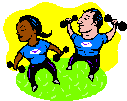



Your Four Brains




Let's begin with a quiz. A truly computer-savvy individual would set this up so it was self-scoring over the Web. I only learned HTML a year ago, so you'll have to score it yourself for now.
Embree Personal Style Indicator
Copyright (c) 2001 - Marlowe C. Embree, Ph.D.
All rights reserved
Read each item below. For each item, there are four response alternatives. Rate the one that fits you best with a 3, the one that fits next best with a 2, the best fit of the two remaining items with a 1, and the item that fits you least of all a 0. For instance:
I enjoy eating...
( 3 ) hot fudge sundaes
( 0 ) freeze-dried earthworms
( 1 ) spinach
( 2 ) bologna sandwiches
Get the idea? Leave no blanks. There are 15 items.
1. I'd love to work as a(n)...
( ) a. accountant
( ) b. salesperson
( ) c. engineer
( ) d. counselor
2. I want others to think of me as...
( ) a. reliable
( ) b. adventuresome
( ) c. intellectual
( ) d. caring
3. I can't stand people who are...
( ) a. flighty
( ) b. boring
( ) c. illogical
( ) d. intolerant
4. One thing I need a lot of in my job is...
( ) a. structure, security, and predictability
( ) b. fun, adventure, and excitement
( ) c. a chance to prove how skilled I am
( ) d. a purpose behind the paycheck
5. A fault I have is a tendency to be too...
( ) a. unimaginative
( ) b. impulsive
( ) c. insensitive
( ) d. fanciful
6. I admire people who...
( ) a. keep their commitments
( ) b. live life to the fullest
( ) c. are self-reliant
( ) d. give of themselves
7. My approach to money is to...
( ) a. save it
( ) b. spend it
( ) c. invest it
( ) d. ignore it
8. I enjoy working with...
( ) a. details and numbers
( ) b. hands-on tasks
( ) c. complex systems
( ) d. people and their needs
9. I get bored when people talk about...
( ) a. imagination and fantasy
( ) b. complex theories
( ) c. their problems
( ) d. practical details
10. I'd like spending time with a famous...
( ) a. corporate executive
( ) b. sports figure
( ) c. scientist
( ) d. religious leader
11. People get into trouble when they...
( ) a. ignore the rules and traditions
( ) b. don't jump in and experience life
( ) c. don't think things through logically
( ) d. try to be someone they're really not
12. It's important for me to...
( ) a. be responsible
( ) b. enjoy myself
( ) c. be competent
( ) d. be authentic
13. People often tell me that I...
( ) a. am a stick in the mud
( ) b. ought to grow up
( ) c. have ice in my veins
( ) d. am too thin-skinned
14. It's hard for me to...
( ) a. try something new
( ) b. look before I leap
( ) c. talk about my feelings
( ) d. be pragmatic and tough
15. I learn best by means of...
( ) a. step-by-step directions
( ) b. hands-on experience
( ) c. logical analysis
( ) d. intuition and imagination
Now add up your (a), (b), (c) and (d) totals. (Yep, this is where your life would be a lot easier if I really knew HTML.) Each total must, if you did the math right, be within a range of 0 (lowest possible) to 45 (highest possible), and the four totals summed together must exactly equal 90.
Your highest point total of the four indicates your most likely style, as explained below. Score (a) is your Commander score, (b) your Adventurer score, (c) your Systematizer score, and (d) your Harmonizer score.
Commanders are motivated by duty, responsibility, security, and the maintenance of order and tradition. Theirs is the "Structured Way". Commanders are careful, linear, stepwise, "bottom up" learners who like to build a solid foundation of facts and details. They thrive on structure, certainty, and predictability.
Adventurers are motivated by fun, adventure, excitement, and life in the present moment. Theirs is the "Active Way". Adventurers are practical, application-oriented, hands-on, experiential learners who like to jump right into things and learn by doing. They thrive on activity, results, and immediacy.
Systematizers are motivated by competence, challenge, mastery, and intellectuality. Theirs is the "Strategic Way". Systematizers are conceptual, logical, analytical, "top down" learners who like to fit new ideas into a mental context or cognitive map. They thrive on complexity, impersonal logic, and mental planning.
Harmonizers are motivated by uniqueness, authenticity, self-actualization, and the expression of deeply held personal values. Theirs is the "Caring Way". Harmonizers are creative, innovative, relational, oceanic learners who like to connect unrelated ideas in a self-directed, free-flowing, autonomous way. They thrive on connections, significance, values, and intuition.
Many believe that your style is linked to which quadrant of the brain is dominant for you. (You may not care about that, but I'm writing this, so you'll just have to take it.) Systematizers and Commanders are left-brained, Harmonizers and Adventurers right-brained. In other words, the former have a linear, stepwise approach; the latter are nonlinear, chasing the rabbit where it runs. Similarly, Systematizers and Harmonizers share an abstract orientation (frontal brain regions dominate); Commanders and Adventurers are both concrete (basal brain regions dominate). None of this paragraph will be on the final exam.
"Who cares?" you may be thinking. If not, you should. Future articles will describe various ways in which these four styles influence job performance, workplace motivation, problem solving and decision making, conflict resolution, and more. As a start, here's how the four types tend to learn. I'll phrase these comments in a form educators can relate to, but corporate trainers should sit up and pay attention, too.
A Commander-dominated classroom will be nitpicky about details. If you promise something in your syllabus, keep your word: woe betide you if you do not. They will often be distressingly literal-minded. They may find it difficult to see the forest for the trees. They may obsess about minutiae such as page margins. They will excel in dealing with facts, but stumble over theoretical material. They are likely to run out of time on exams due to compulsive overchecking. The Commander style run wild becomes obsessive-compulsive disorder.
An Adventurer-dominated classroom will be easily bored by the "talking heads" approach that so dominates American education. They will want something to do (not just think about) and will make no bones about letting you know that. They will tune out abstractions. They will question the relevance of your discipline (anything that cannot be put to good use within five minutes is deemed irrelevant). They may become disruptive. The Adventurer style run wild becomes attention deficit disorder.
A Systematizer-dominated classroom will become top-heavy with multisyllable words and convoluted arguments. (Of all the types, Systematizers find it difficult to assiduously eschew obfuscation.) The classroom may be confrontational because Systematizers can't help questioning everything. They will ferret out hidden assumptions, will search for tiny logical flaws, will demand proof when trust is required. The Systematizer style run wild becomes schizotypal disorder.
An Harmonizer-dominated classroom will lose whatever focus it may have initially had (for an example, review this essay so far). It will become so nonlinear that any semblance of rational structure is quickly lost. Subjective values may be defended at any cost. Enthusiasm may be confused with understanding. Students will either love you or hate you (the former is actually more dangerous since Harmonizers are prone to, well, idealize), so emotions can reach a fever pitch. The Harmonizer style run wild becomes dependent personality disorder.
More in later articles. Stay tuned! (Your style determines how patient you will be in waiting for the next article in the series.)
Copyright (c) 2001 -- Business Development Group
All rights reserved